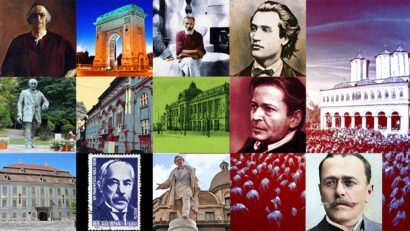100 years of Romanian Olympic spirit
The early days of the Olympic idea in Romania.

Steliu Lambru, 12.04.2014, 14:04
The revival of Antiquity’s Olympic spirit was one of the ambitions of a modern Europe that wanted to build a society in which everyone should have the benefit of equality and fair competition. Antiquity was the age to which Europeans returned time and again, whenever they realised that the world they were living in was heading in the wrong direction, and that everything that had once been good was lost. The spirit of Ancient Greece also dominated the Renaissance. Looking back at the ancient Olympiads helped see man as a universal being, beyond political, economic, social, racial and cultural divides.
The father of the modern Olympic spirit, actually the founder of the International Olympic Committee is the French historian and educator Pierre de Fredy, baron of Coubertin (1863-1937). His philosophy was an inspiration to all those who committed to bringing the Olympic spirit back to the attention of the modern world based on what is now a very popular and undeniable belief: namely that the most important thing in life is not triumph, but the struggle itself, it’s more important to struggle fairly rather than to win. The fair play spirit that had once animated the Antiquity’s Olympiads was supposed to help people overcome their selfish interests and embrace mankind’s universal, long-lasting values.
Since central and Eastern European societies were quick to adopt any western trend, the Olympic spirit also came to animate Romanians. But we should be aware that south-eastern Europe had its own Olympic history, its pre-Olympic age, so to say. An outstanding personality of this pre-Olympic age was the Greek landowner and merchant Evanghelie Zappa (1800-1865) who owned property around Bucharest and in the Baragan plain, in the south, which is Romania’s most fertile farming land. An active participant in the Greek national liberation movement, in 1856 Zappa came up with the idea of drafting a memorandum according to which Athens should organise a series of sports competitions in 1857, to be called Olympiads.
Furthermore, the Greek tycoon, who was also a generous financier, committed himself to paying all expenses for the event. Evanghelie even donated money for the construction of the Athens Zappeion, a building compound including a stadium, amphitheatres for conferences and gymnastics halls. Unfortunately Zappa died in Brosteni, in Romania’s Ialomita County, in the south, before the Zappeion compound was finished. Evanghelie’s cousin, Constantin, later monitored the completion of works on the compound. Evanghelie Zappa also remained in Romania’s history as a contributor to the setting up of the Romanian Academy and as a donor for the reconstruction of Bucharest, which was seriously damaged by the devastating fire of 1847.
The Olympic spirit turned into an important cultural trend in the newly founded Romanian state after 1877. It was embraced by what was then Romania’s society personalities and elites, as a sign of the country’s speedy Westernisation. On March 27, 1914 the Romanian Olympic Committee was founded, as a natural consequence of the actions supporting sports competitions and fair play. The first chairman of the Committee was Prince Carol, the future King Carol II. He was twice elected to chair the body promoting the Olympic spirit, between 1914 and 1920 and between 1923 and 1930. After becoming King of Romania in 1930, Carol II remained a promoter of the Romanian Olympic spirit until he abdicated in 1940. Among the first members of the Romanian Olympic Committee were Prince George Valentin Bibescu, a promoter of aviation in Romania, medical doctor Ion Costinescu, a minister in the Liberal governments and mayor of Bucharest, medical doctor Carol Davila, the founder of Romania’s medical school, lawyer Ion Camarasescu, a deputy and minister, art historian Alexandru Tzigara Samurcas, and geologist and professor Gheorghe Murgoci.
The promotion of the Olympic spirit in Romania did bear fruit. In 1924, Romania officially participated for the first time in the 8th edition of the Olympic Games in Paris. It was also in 1924 that an absolute first occurred: the first Olympic medal won by the Romanian rugby team, which was ranked 3rd. Ever since the Romanian sports delegation has taken part in all the editions of the Olympic games, except for the summer Olympics of 1932 and 1948, and the winter Olympics of 1960. Next here is Romania’s medal record before the 2012 London Summer Olympics: 301 medals, 88 of which were gold, 94 silver and 119 bronze, all in the summer editions of the Olympic Games. In the winter Olympic Games Romania won one single medal, bronze in Grenoble, in 1968. The winners of this medal were Ion Panturu and Nicolae Neagoe in the two-man bobsleigh event.




























